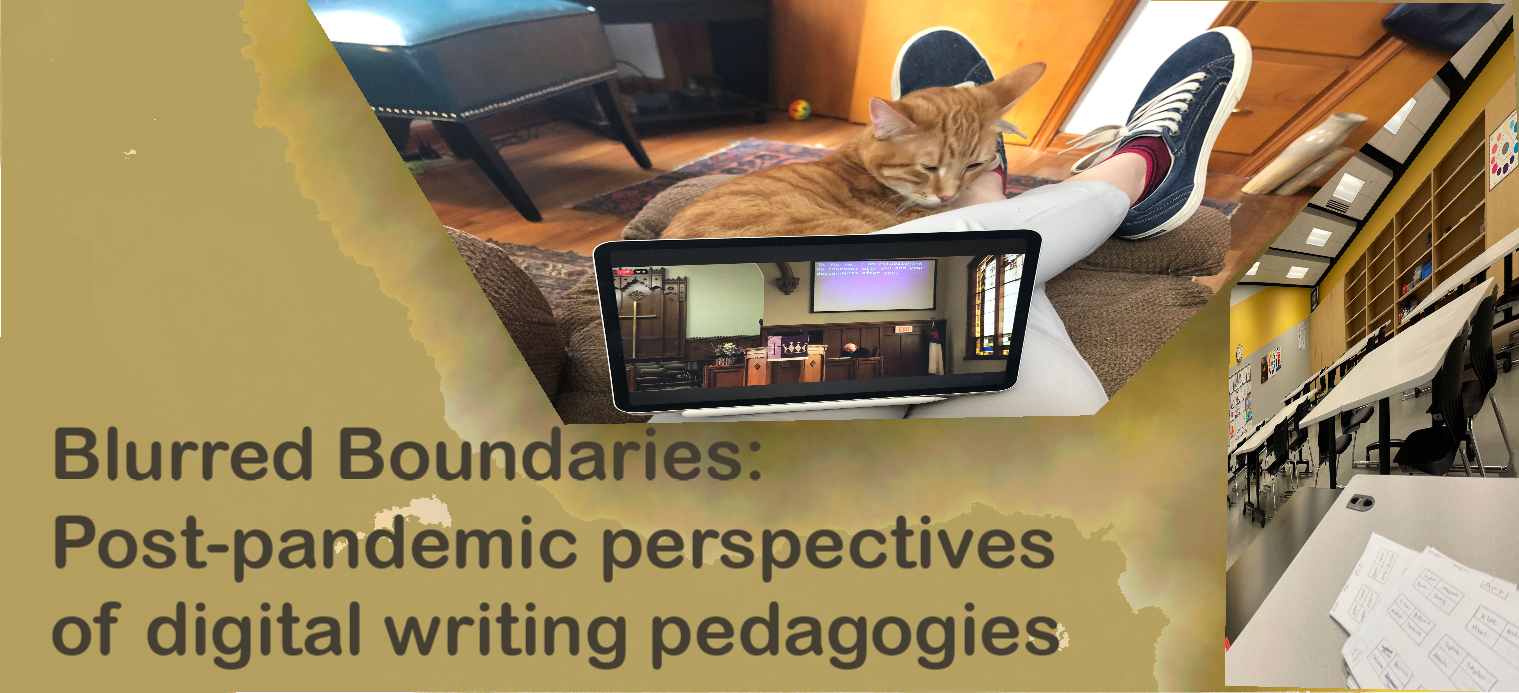
Christopher Sean Harris, California State University, Los Angeles
Lanette Cadle, Missouri State University
Elizabeth A. Monske, Northern Michigan University
 In 2013, Lanette Cadle and Elizabeth Monske published the double special issue of Computers and Composition, “Deploying 21st Century Writing on the Economic Frontlines,” which examined “the disconnect between theory and reality for techno-rhetors moving from technology-rich graduate training to the less-than ideal setting normal for most new instructors.” The economic stresses to online writing instruction considered in that special issue (access to technology/wifi, software, infrastructure, training, classroom spaces, etc.) did not abate; instead, we are now, at the time of this writing, faced with unforeseen challenges placed on the shoulders of an already teetering academia. No one expected this pandemic. As the original editors from that 2013 Computers and Composition Online issue, with the addition of a third editor who is a colleague and author from that past issue, Christopher Sean Harris, we all spoke regularly through the beginning and throughout “Stay at Home,” continuing our supportive community we began in graduate school, where our working and personal lives became blurred.
In 2013, Lanette Cadle and Elizabeth Monske published the double special issue of Computers and Composition, “Deploying 21st Century Writing on the Economic Frontlines,” which examined “the disconnect between theory and reality for techno-rhetors moving from technology-rich graduate training to the less-than ideal setting normal for most new instructors.” The economic stresses to online writing instruction considered in that special issue (access to technology/wifi, software, infrastructure, training, classroom spaces, etc.) did not abate; instead, we are now, at the time of this writing, faced with unforeseen challenges placed on the shoulders of an already teetering academia. No one expected this pandemic. As the original editors from that 2013 Computers and Composition Online issue, with the addition of a third editor who is a colleague and author from that past issue, Christopher Sean Harris, we all spoke regularly through the beginning and throughout “Stay at Home,” continuing our supportive community we began in graduate school, where our working and personal lives became blurred.
It quickly became clear to us that if positive change was going to happen in education, then it would be initiated by those on the ground, the teacher-scholars who perform Writing Studies pedagogical research. Existing online teaching organizations, like Global Society of Online Literacy Educators and the Online Writing Instruction Community, WPAs across the nation, and social media groups, just to name a few, quickly answered the call to assist novice and veteran writing faculty in making the transition to Emergency Remote Teaching. It was evident that Writing Studies faculty, those who researched and specialized in online writing instruction in particular, were vital for this new shift in writing pedagogy during the pandemic to have any sort of positive outcome.
To quote classic SNL character Emily Litella (played by Gilda Radner), “It’s always something.” If it’s not economics of online writing instruction (OWI), then it's a world-wide pandemic that restructures world cultures overnight. Almost ten years and one pandemic later, well, it’s always something. Thanks to the pandemic, the money should have been easier to find, because many administrations did not focus on the brick and mortar spaces but on the digital; instead of heating and cooling in their offices, many faculty were provided with unlimited Zoom licenses. Even though cultural, institutional, and pedagogical change is always difficult, and a healthy thread of resistance is to be expected, as we all shifted to remote emergency teaching, we seemed to unite and thirst for community, which allowed, even if temporarily, an acceptance and a need for digital pedagogies that OWI research and community could offer. The resulting webtexts examine these issues and needs empirically and as lived experiences.
In “The Role of Previous Online Teaching Experience During the Covid Pandemic: An Exploratory Study of Faculty Perceptions and Approaches,” Steven D. Krause analyzes the results of a survey he administered in the midst of the pandemic about faculty perceptions of a/synchronous teaching. Of note, Krause’s study found that those who had taught online before the pandemic were nearly four times less likely to teach synchronously and twice as likely to teach both synchronously and asynchronously than those who never taught online before the pandemic. Krause postulates that perhaps faculty with no experience teaching online opted to teach synchronously with video conference software such as Zoom because it was the simpler way to manage the sudden shift to a new mode of instruction. Perhaps these survey results quite effectively highlight the underrepresented distinction between opting to teach writing remotely and suddenly needing to teach writing remotely.
Next, in “New Priorities in Strange Times: How Writing Programs Navigated Emergency Remote Teaching,” Marisa Yerace reports on her survey and interviews of writing program administrators, in which she asks them to reflect on the quick administrative and pedagogical decisions they had to make during the pivot to remote instruction. Yerace states that since the contexts for teaching online change, OWI training isn’t a one-shot deal. Instead, faculty should routinely consult the evolving body of OWI research to try new methods and refine their remote teaching practices so they remain flexible to changing demands.
Margaret Weaver and Leslie Seawright discuss the writing program community they developed through necessity during the pandemic when a change in leadership and a crumbling graduate teaching practicum with an outdated WPA model made it a good time for change. In “Building Faculty Buy-In Through a Virtual GTA Practicum,” they chronicle the history and the challenges for the graduate teaching practicum, making changes that overcame past problematic leadership to create a strong online community which turned into an egalitarian space that included both graduate teaching assistant and faculty. It ends with concerns about the later move back to a face-to-face mode of delivery after significant success in an online environment.
Moving from professional development to the classroom itself, Philip B. Gallagher discusses the importance of developing digital learning software in accordance with student needs; however, he also advocates for faculty to use software that supports student privacy. In “Balancing Privacy & Presence in Post-Covid Pedagogy: A TPC Study,” Gallagher shares faculty interviews as he asks them how they improved their online writing pedagogies during the pandemic, all while supporting student privacy. Gallagher found that even the most experienced faculty experienced moments of self doubt when navigating the interpersonal and pedagogical needs brought on by the move to remote instruction during the pandemic. As faculty adopted video conferencing and other social software during the pandemic, issues surrounding privacy became increasingly dominant thanks to screen capture and data sharing.
In Jennifer Sheppard’s “How the Pandemic Changed Us: Training, Technologies, and Pedagogies in COVID-Era Online Writing Instruction,” she extends the discussion of how to create inclusive and accessible course materials by examining the results of a qualitative research study. Unlike some of the other approaches in this issue, Sheppard’s survey considers the teacher’s vantage point. The results and analysis should help post-pandemic teacher trainers develop online writing course materials that are sensitive to diverse student populations from different geographic areas and with different socioeconomic statuses.
In a mix of text and video interviews, Paul Cheng and Joshua Adachi explore how “Leveraging Remote Environments to Multiply Perspectives and Model Institutional Processes Through Colleague Collaboration” can support writing students. They note the paucity of existing scholarship on methodologies for holding completely online office hours and then propose digital methods to fine-tune existing practices by supporting their writing students with collaborative video office hours hosted by multiple writing faculty. A key benefit of such office hours is that they help reinforce the notion of a university community by helping students interact with more faculty.
Helen Choi and Malavika Shetty demonstrate the importance of colleague collaboration as they share their “Perspectives on Teaching with Wikipedia in Writing Courses Before and During the COVID-19 Pandemic.” The authors detail their assignment and student interactions and how this assignment worked for them in the face-to-face and digital classrooms, providing qualitative and qualitative data. Additionally, the authors who were writing and teaching on opposite sides of the United States note how their ability to teach this assignment also aided their international students who were abroad. Along with Cheng and Adachi, Choi and Shetty provide a relevant and practical take away for the classroom in this next era of learning.
While the December 2022 special print issue of Computers and Composition addresses a variety of research and narrative, the webtexts in this special issue have the advantage of being able to show as well as tell. Even in this introduction, we acknowledge that we did not work in isolation and are thankful the support and activities beyond our work and colleagues; felt the need to include some photos that document what teaching writing online, working remotely during a pandemic, and “living” was like for us–pets, bread baking, family photobombs on Zoom. This, too, was part of our pedagogy, and if social media is to be believed, part of the pedagogy for many, many others. To build a strong and positive online writing pedagogy that lasts in the future, we must acknowledge what has happened, whether traumatic or pleasurable, consider it, and write about it so we remember, learn, and grow.
Finally, we thank all who submitted proposals as well as the webtext authors detailed above. For some of our authors, creating a webtext was a whole new challenging world, so we especially thank these new web-authors for making the leap into multimodal scholarship during a pandemic. May your first webtext be the first of many more in your future.
Enjoy a few pandemic perspectives from the editors!
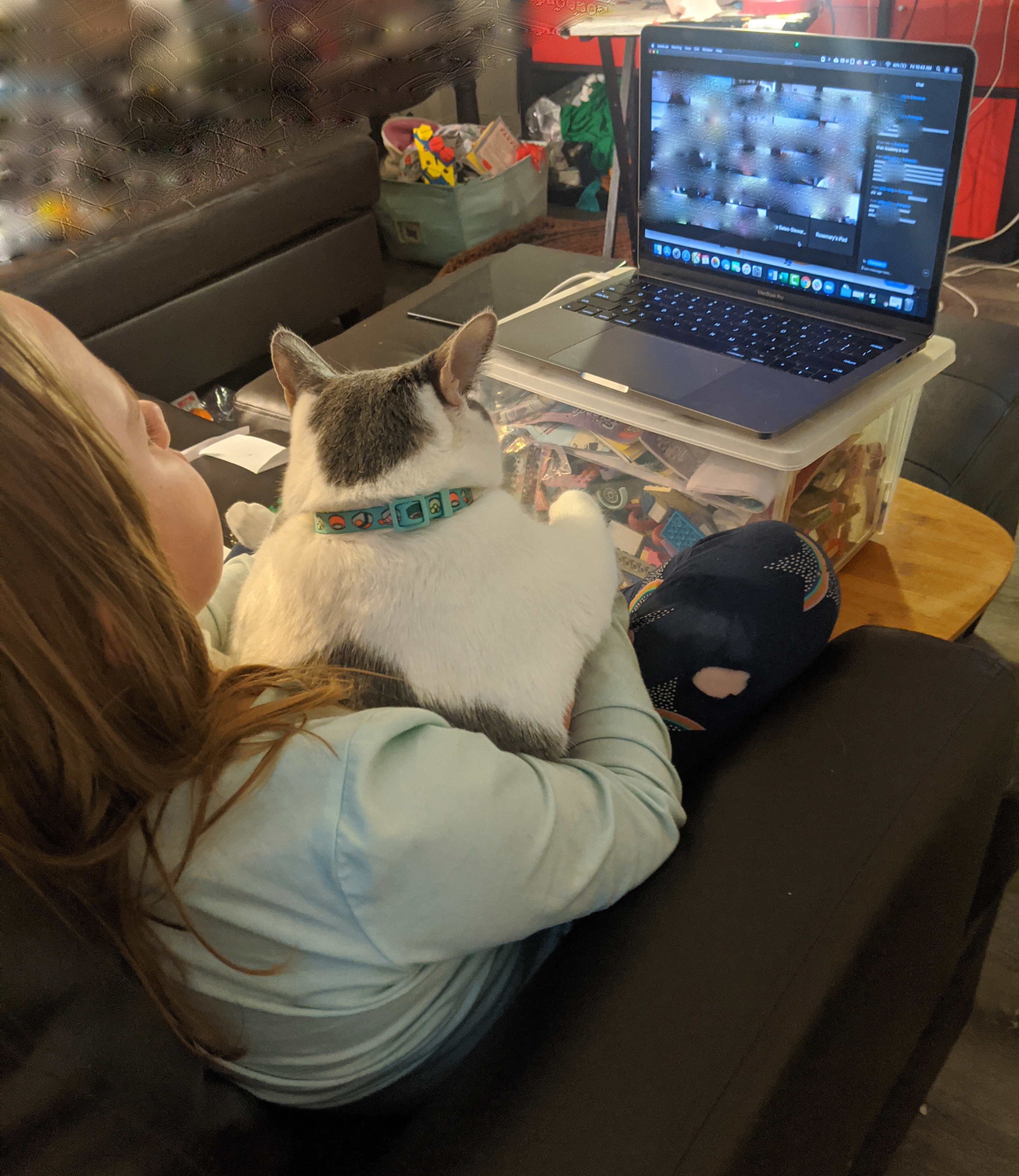
Christopher's daughter never failed to offer her services as a Zoombombing expert. Here she is in kindergarten class in 2020.
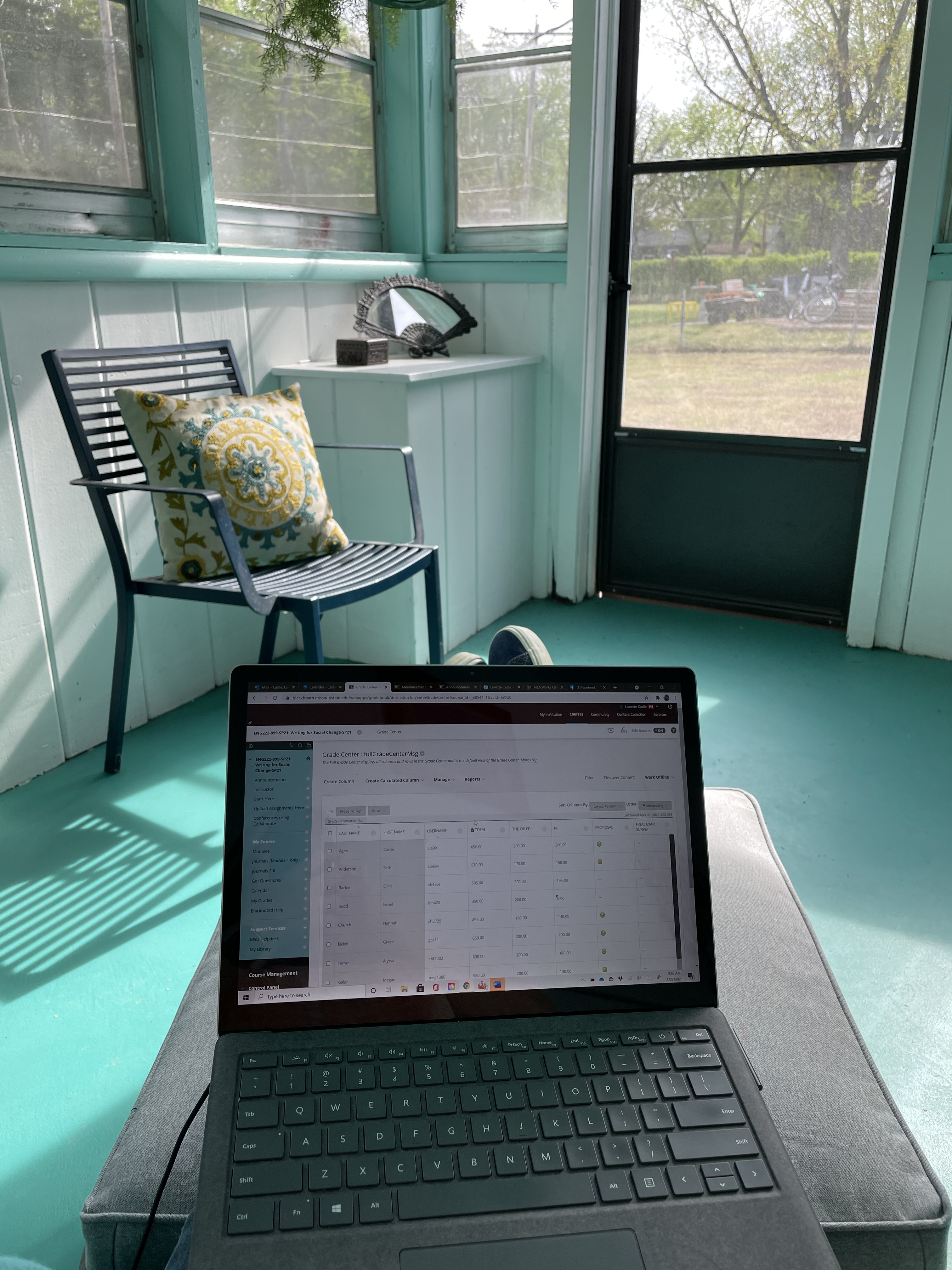
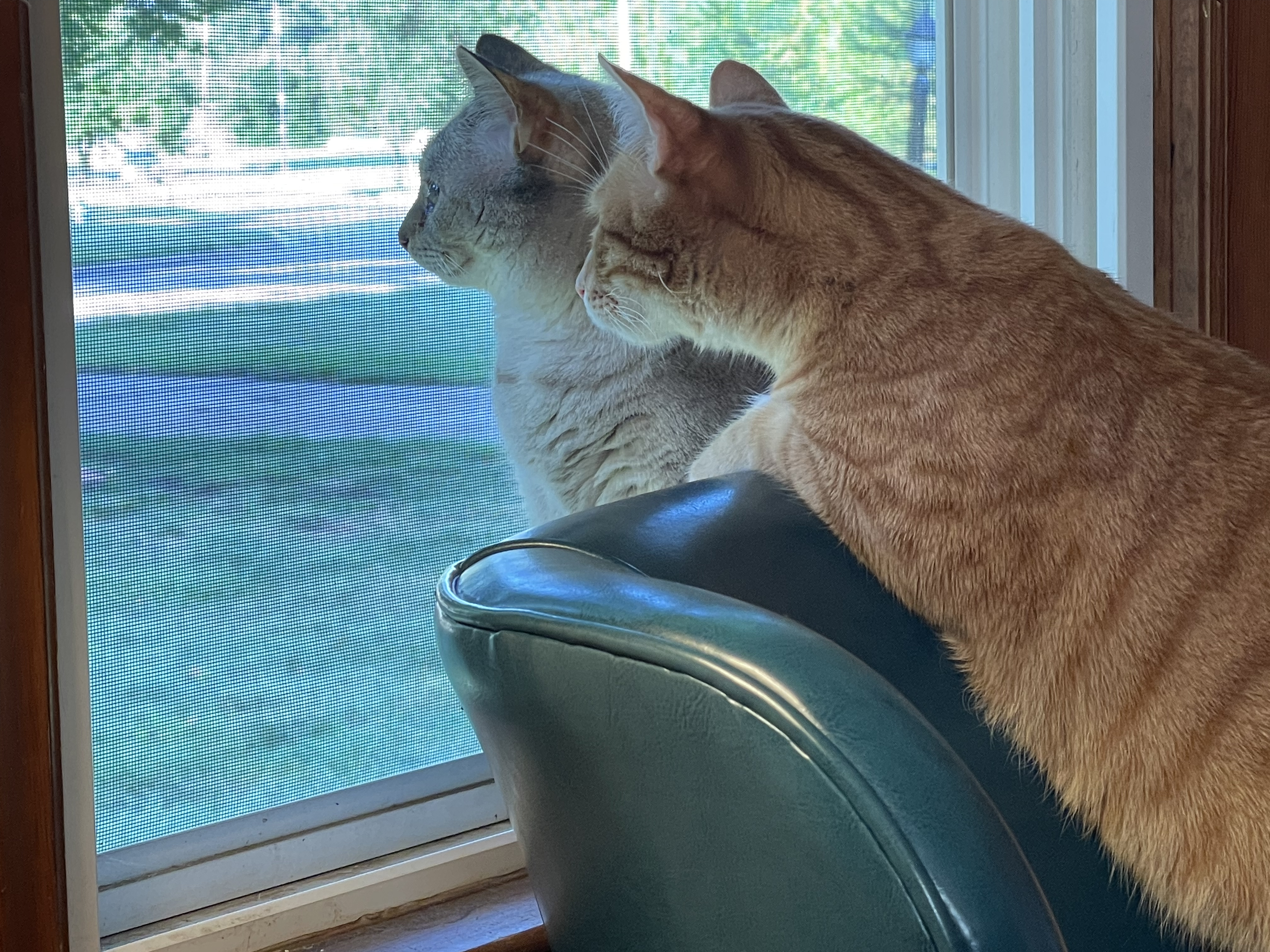
Left: This sunroom was Lanette's HGTV summer project and turned into her summer office. Right: Shadow and Mango keeping the neighboprhood in line.

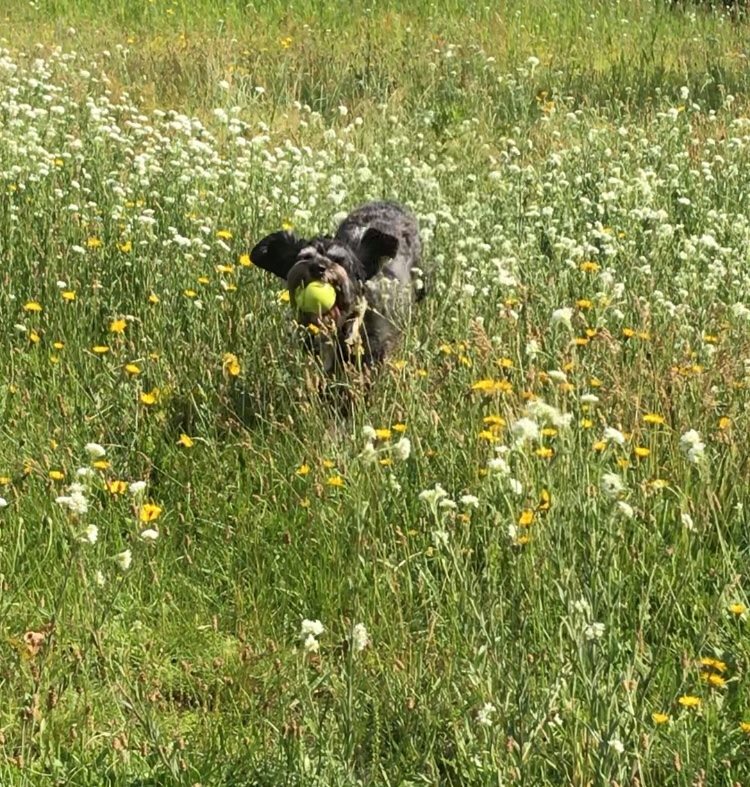
Left: Walter letting Liz know it's time to stop working. Right: Walter's Little House on the Prarie moment.

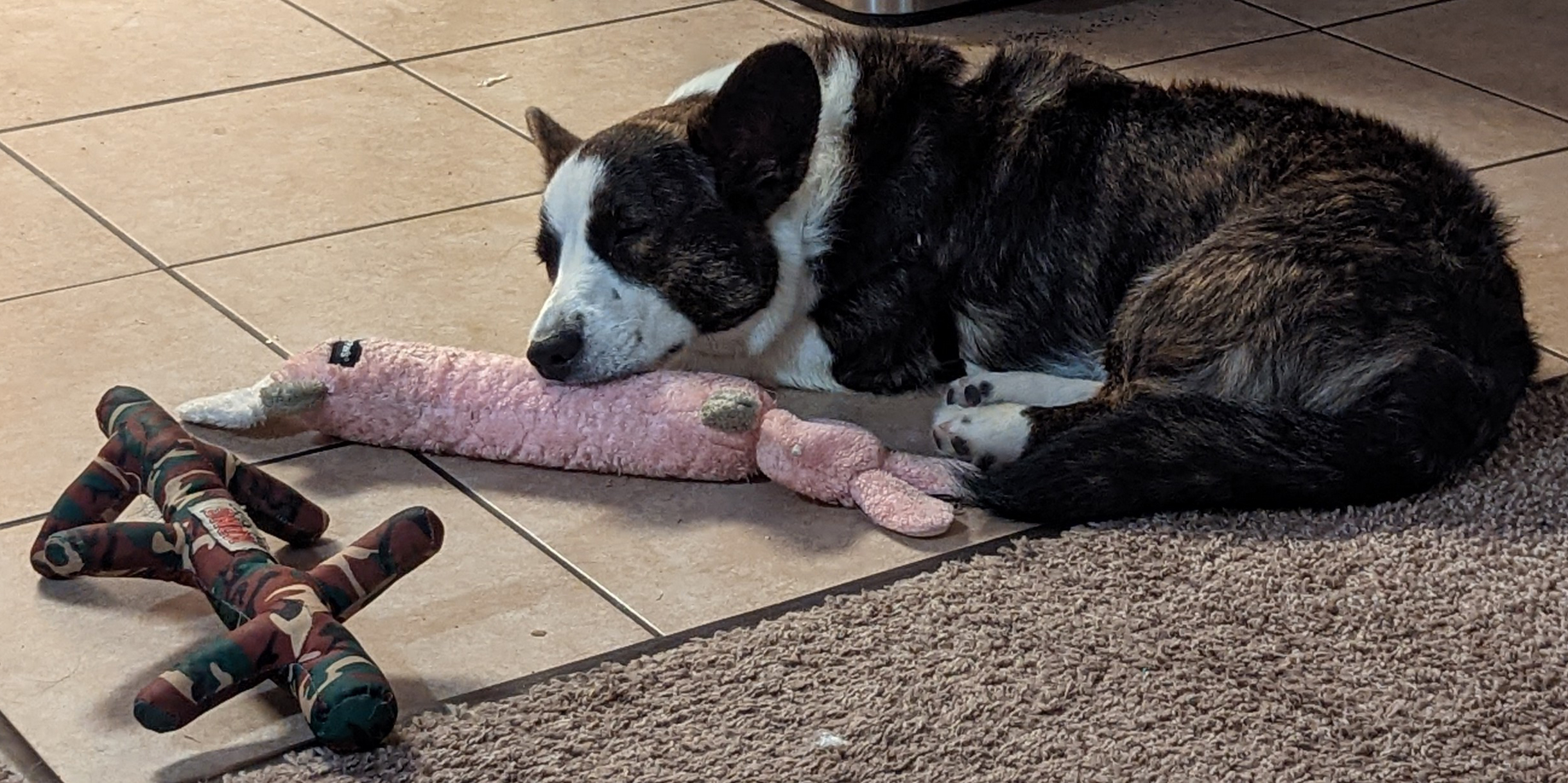
Left: During the pandemic, Lanette remembered that she knew how to bake bread. Right: Cwlwm, pronounced Quill-em, joined Christopher's family during the pandemic. He loves toys and naps.
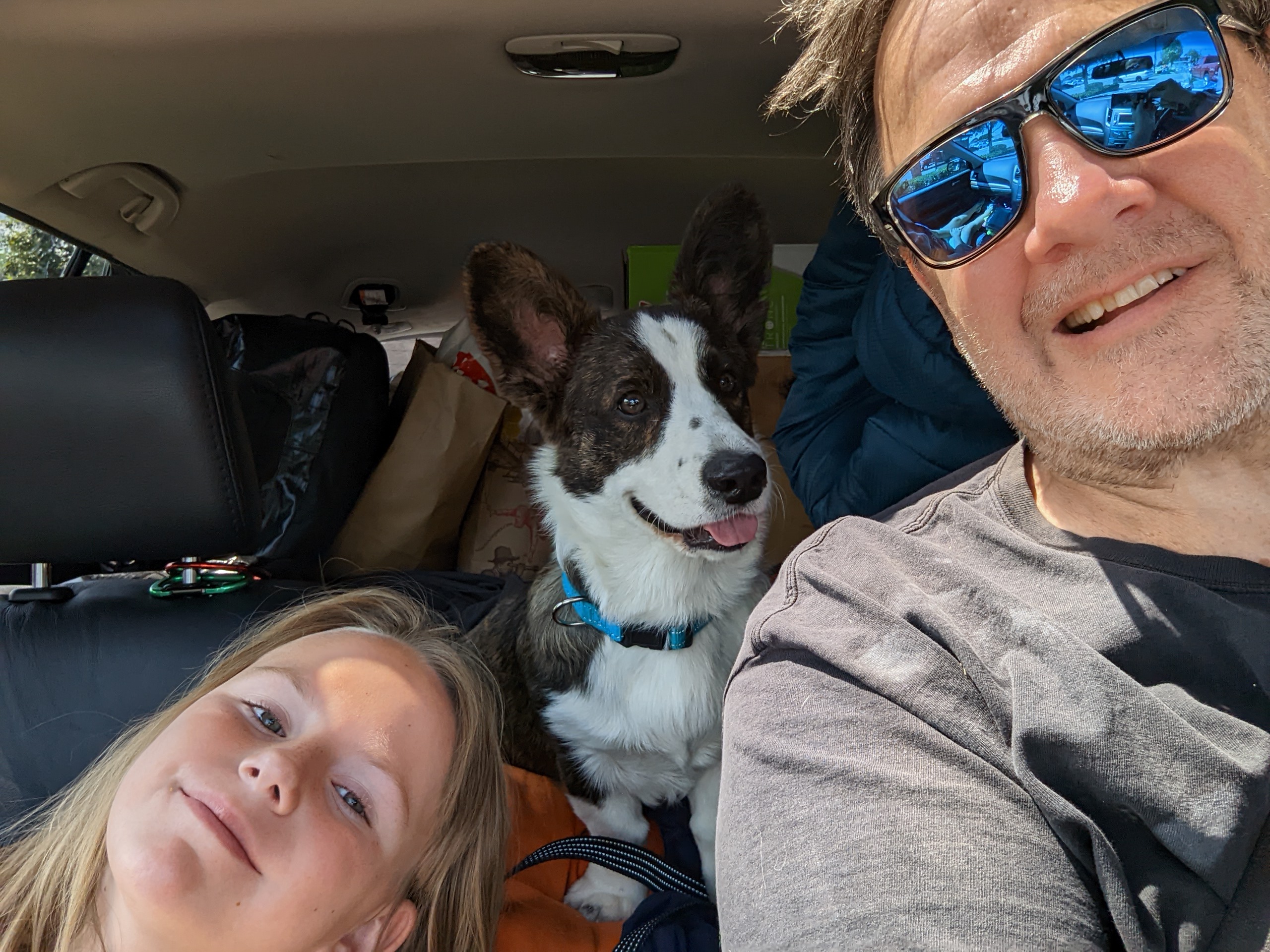
Cwlwm, Christopher, and his daughter driving to the mountains on a pandemic camping trip
Ember and Cwlwm participating in pandemic pet yoga. Right: Sasha says, 'The laptop has got to go!''